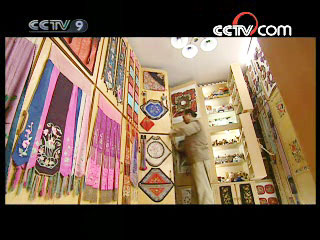Source: CCTV.com
08-07-2008 08:38
 |
Everyone has a dream of collecting something, but few can turn the dream into a lasting career. Some of them are happy or adherent, and some even have learned philosophies from their collecting. It is said that each collector has a different story in which lies a unique piece of history.
It’s been 46 years since Cui Yongping started the shadow play performances.
 |
The Cui couple’s shadow play museum was built by transforming a former residence and is currently situated in Tongzhou District, Beijing. More than thirty thousand puppets ranging from ancient China, Latter-day and modern times are collected and exhibited in this small and joyful location.
Shadow play originated during the Western Han Dynasty (Xi Han) and then came down to northern China, Yangtze River, Sichuan, Hubei, and Hunan provinces. It has a history of over 2000 years. During its long course of development, shadow play has formulated into various schools and styles, among which, the most famous are Longdong shadow play in Gansu, Shaanxi shadow play and Shanxi shadow puppetry.
Cui used to be the Director-General of Beijing Shadow Play Troupe. Both he and his wife Wang have been awarded the title of National Top Actor and Actress.
Since that visit to Germany in 1991, Cui decided to establish a private museum of shadow play puppet collections. Unexpectedly, Cui was hit by a sudden illness.
When Cui was 47, he suffered a stroke and couldn’t move his right arm which made it difficult to perform. He used to dub several characters during the show, but at that time, he could hardly speak. The Cui couple spent all their savings to cure his illness which left no money for opening the museum.
However, Cui Yongping did not give up in the face of hardship. The couple have begun to reinvigorate their love of shadow play art. Six years later, they bought a property in suburban Beijing and eventually started running their private shadow play museum.
For many years, they bought puppets from folk people by using each and every penny that had been saved. They sought to bring these ancient arts home.
This “Eighteen Layers in Hell” is a tidbit collection from the Qing Dynasty. Some private collectors once offered $100,000 for the whole set, but Cui refused to sell. He said, “Things that have been passed down for generations are priceless.”
Now, the old couple’s two daughters have settled abroad. The reception work is done by the Cuis. Sometimes, they also receive offers to do shadow play performance and to give authentications.
The museum has been running for three years, and more and more people came and participated and shared in their dream. Next, the couple are planning to expand their horizon abroad and start branches in America and Canada to further spread the art of shadow play.
